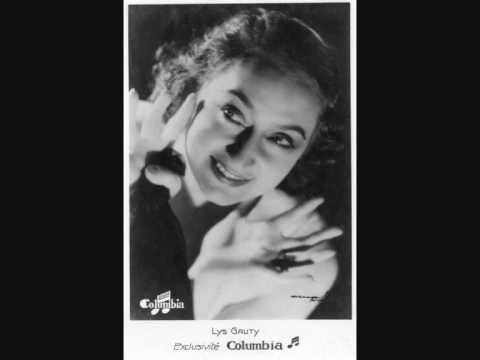Having escaped the Nazi takeover of the German government, Kurt Weill found himself in Paris in 1933, trying to get a foothold in a new artistic landscape. His reputation there was solid, though based mostly on the 1930 French film and stage versions of The Threepenny Opera (L’Opéra de quat’sou), which had been popular. Still, at thirty-four, Kurt Weill was essentially starting over. “[Weill] arrived in Paris with very little beyond his good name” says Brecht and Weill scholar Pamela Katz, author of The Partnership. Luckily, he met cabaret and film star Lys Gauty, who commissioned two songs from him: Complainte de la Seine, and this one. With so many Weill performances influenced by the whiskey baritone of the latter-day Lenya, this performance by Gauty (1934) reminds us that this song was written for a young and glamorous cabaret singer.
Even though Je ne t’aime pas wasn’t written for Lenya, in my opinion, her Surabaya Johnny fingerprints are all over it. The repeated trope, “I don’t love you” sung by Gauty might well have been Weill’s sentiments regarding his ex, then living in Switzerland with her current lover. When Weill and Lenya reunited before their move to the USA, friends asked how in the world he could take her back. His reply was, “What can I say? She’s Lenya.”
| Retire ta main, je ne t’aime pas Car tu l’as voulu, tu n’es qu’un ami. Pour d’autres sont faits le creux de tes bras Et ton cher baiser, ta tête endormie. |
Pull back your hand, I don’t love you For you wanted it, you’re just a friend. The crook of your arm was made for others And your dear kiss, your sleeping head. |
| Ne me parle pas, lorsque c’est le soir Trop intimement, à voix basse même Ne me donne pas surtout ton mouchoir : Il renferme trop le parfum que j’aime. |
When it’s evening, don’t talk to me Too intimately, nor even in a whisper Do not give me your handkerchief It holds too much of the fragrance I love. |
| Dis-moi tes amours, je ne t’aime pas Quelle heure te fut la plus enivrante ? Et si elle t’aimait bien, et si elle fut ingrate En me le disant, ne sois pas charmant. |
Tell me your loves, I don’t love you What hour was the headiest to you? And if she didn’t love you, or she was ungrateful While telling me, don’t be charming. |
| Je n’ai pas pleuré, je n’ai pas souffert Ce n’était qu’un rêve et qu’une folie. Il me suffira que tes yeux soient clairs Sans regret du soir, ni mélancolie. |
I didn’t cry, I didn’t suffer It was only a dream and foolishness. It’s enough for me that your eyes be bright Without evening regret nor melancholy |
| Il me suffira de voir ton bonheur Il me suffira de voir ton sourire. Conte-moi comment elle a pris ton cœur Et même dis-moi ce qu’on ne peut dire. |
It’s enough for me to see your happiness It’s enough for me to see your smile. Tell me how she captured your heart And even tell me what can’t be said |
| Non, tais-toi plutôt… Je suis à genoux Le feu s’est éteint, la porte est fermée Ne demande rien, je pleure… C’est tout. Je ne t’aime pas, ô mon bien-aimé. |
No, be silent instead. I’m on my knees The fire is out, the door is shut Don’t ask me anything, I’m crying. That’s all… I don’t love you, Oh, my beloved |
| Retire ta main, je ne t’aime pas je ne t’aime pas |
Pull back your hand, I don’t love you I don’t love you |



Good post on a great song. Pity there’s no mention of the talented lyricist, author and occultist Maurice Magre…
I read somewhere that the song was from the point of view of a woman singing to her same sex lover.